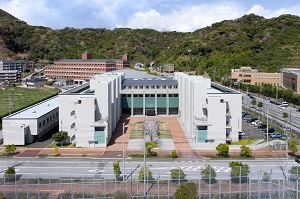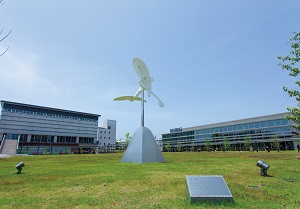本文
Faculty of Nutrition
Department of Nutrition/Enrollment capacity: 40/Ike Campus
Faculty of Nutrition—the first of its kind at a public university in Japan—guides students along the path to becoming registered dietitians.
By delving into modern society’s health-related issues through explorations of the surrounding social and economic environments, students in the Faculty of Nutrition learn how to form their own arguments from multiple perspectives.
In addition to giving students the knowledge of dietary habits and nutrition that they need to become experts on food, which forms the basis of human health, the Faculty also helps students cultivate the application-oriented mentality for growing as professionals capable of flourishing in a wide variety of fields.
The Faculty’s focus on small class sizes helps create close, rewarding relationships between students and teachers and creates an environment conducive to thorough, far-reaching study.
Our graduates
Gain insight into the nature of humanity, health, and the environment, delve into the study of food, which represents the source of all life, and work in a wide variety of fields to help people live healthy lives
Look at things from a broad perspective, think critically about what they see, and take the initiative to create new value
Learning by Cultivating a Foundation as a National Registered Dietitian, Conducting Research, and Acquiring Knowledge
The curriculum of the Faculty of Nutrition develops the ability of students to find issues on their own and put their learning into action to solve those problems. Students conduct fieldwork-based research, and under the guidance of full-time teaching staff members, strive to integrate their knowledge through graduation research.
There are four types of specialized course: foundation courses, major courses, related courses, and special research. Students can select teacher education courses to become nutrition teachers/home economics teachers.
Content of classes/practical training
Practical training/laboratory work
In addition to learning about food and nutrition, students examine how they function in the human body to maintain and restore health. Students research and verify the relationship between food and the body.
Field training
Students utilize the knowledge they have gained at the University to provide actual nutrition management guidance at the Kochi Health Sciences Center, health centers, preschools, public health centers, Self-Defense Force facilities, and other facilities in Kochi Prefecture.
General exercises
Students gain the ability to work comprehensively in the six major areas, and engage in focused study in preparation for passing the national exam to become a national registered dietitian. Prior to the national exam, students are given practice tests and provided with focused support.
Contents of the main specialized courses
Foundation courses
Society, the environment, and health
Students gain an understanding of the relationships between society, the environment, and health, and learn about health promotion and prevention of disease.
Structure and function of the human body and the mechanism and treatment of disease
Students gain a systematic understanding of the structure and function of the human body, and learn about the causes, pathology, diagnosis, and treatment, etc., of major diseases.
Food and health
Students learn about the constituent elements in food, as well as the process extending from the production of food, through processing/preparation, and to consumption by humans. Students gain an understanding of the impact on the nutrition and safety, etc., of the human body, and assessment of those factors.
Major courses
Basic nutrition
Students study the digestion/absorption and function of nutrients, as well as the metabolism and physiological significance of nutrients, to gain an understanding of nutrition.
Applied nutrition
Students study the nutritional and physiological characteristics of each stage of life to gain an understanding of nutrition management according to physical and nutritional status.
Nutrition education
Students learn the ideal nature of nutrition education that encourages the modification of behavior, how to implement basic theory, behavioral science theory, and the fundamentals and application of counseling, directed toward primary prevention of diseases, maintenance of health, and improvement of the QOL for the whole person.
Clinical nutrition
Students learn matters needed for appropriate nutrition management based on the characteristics of the state and nutritional status of the sick or injured person. Students also gain an understanding of the role of nutrition management in medical/caregiving systems and team medical treatment.
Food service systems management
Students develop the ability to manage and operate food services, including nutritional, safety, and economic aspects. Students also gain an understanding of the principles and application of marketing, and learn about organizational management and other aspects of management.
Public health nutrition
Students study matters needed to consider health and nutrition problems in specific regions and occupational fields, and maintain and improve the health of the group.
Licenses and qualifications that can be acquired
Dietitian
Eligibility for the national exam to become a national registered dietitian
Nutrition Teacher First Class
Junior High School First Class, Home Economics; High School First Class, Home Economics
* Certification as a nutrition teacher or as a home economics teacher, but not both, can be acquired in four years.









